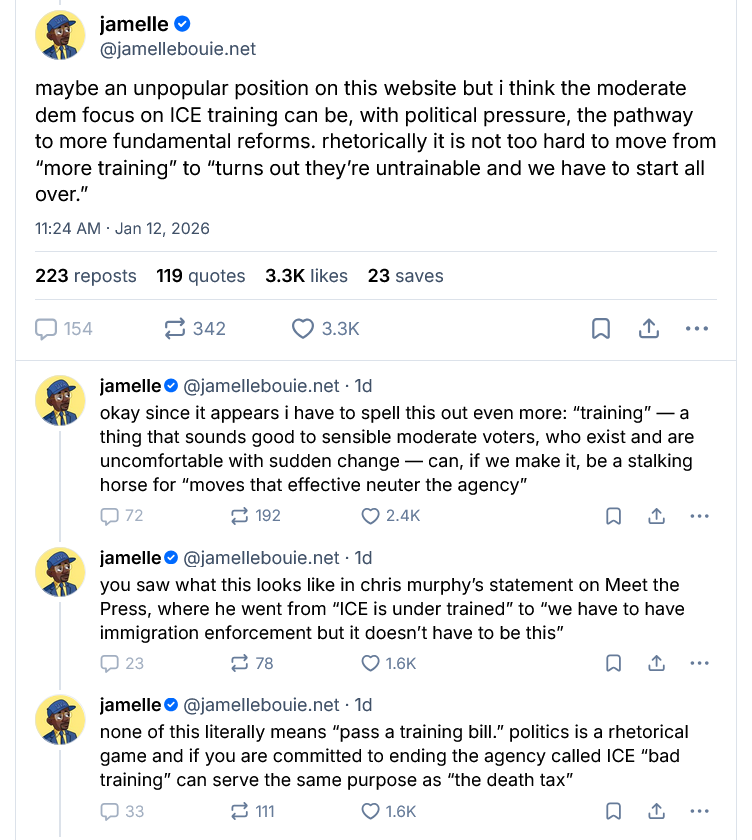UPDATED THREAD. You're going to hear a lot about how cops need more resources because "crime is surging" in the next few months. It's propaganda, and here's how you can respond:
First, what constitutes a "crime" is determined by people in power who have a lot of money.
https://twitter.com/equalityAlec/status/1402265276893339662
Second, cops manipulate crime stats for political reasons. Cops don't even count the *violent and sexual crimes that cops commit,* which would entirely reverse the crime stats in every city and state.
https://twitter.com/equalityAlec/status/1400820167047888896
Third, police ignore most "crime." They only look for *some* crimes committed by *some* people in *some* places. A school fight in a poor neighborhood is recorded as a “crime,” but a fight in a wealthy private school is not. Read hundreds of examples here: yalelawjournal.org/forum/the-puni…
Fourth, police have incentives to focus on some “crimes” and not others. They make billions of $ in overtime for low-level arrests. This is one reason cops have ignored 100,000s of untested rape kits while making record drug arrests for decades. ilr.law.uiowa.edu/print/volume-9…
Fifth, police corruption in search of extra cash and weapons affects all of what cops do and what they tell us about what they do. For example, police take more property through civil forfeiture than all “property crimes” combined.
https://twitter.com/equalityAlec/status/1412428329806860288
Sixth, only 4% of all cop time goes to what they call "violent crime." And cops are terrible at solving "violent crime." Overwhelming evidence establishes that cops and prisons actually increase future “crime.” So, cops are terrible at preventing harm. nytimes.com/2020/06/19/ups…
Seventh, what cops call “crime” is different from what causes harm. E.g., tobacco kills 480,000 people every year in the U.S, including 41,000 from second-hand smoke. These preventable deaths dwarf police-reported data on deaths from the drugs cops call “crime.”
Eighth, the same is true of water/air pollution and fraudulent home foreclosures, all of which cause huge death rates that kill far more people than what cops call homicides. nytimes.com/2009/09/13/us/…
Ninth, wage theft by employers isn't in crime stats b/c it is almost never investigated by cops, but it costs low-wage workers an estimated $50 billion/year, dwarfing the cost of all cop-reported robberies, burglaries, larcenies, and car thefts combined.
https://twitter.com/equalityAlec/status/1405935877013086212
Tenth, did you know that rich banks make about as much in fraudulent “overdraft” fees as all of what police call “property crime” combined in the U.S.? Did you know that none of this makes it into police “property crime” statistics? prospect.org/economy/big-ba…
Eleventh, these are millions of yearly white-collar “crimes” by big corporations and the wealthy people who own them but police don’t put them in their crime stats. Read more here about why cops distort the concepts of "crime" and actual harm. currentaffairs.org/2020/08/why-cr…
Twelfth, people will say: but even if "crime" is politicized and even if "violent crime" is actually down in 2021, "shootings" are up. Well, gun sales are up 40% and we’re in a global pandemic mental health crisis. Murder is a problem but not one related to more cops!
Thirteenth, the initial 2021 trend of more shootings is especially accelerated in places that increased police funding, and almost no city decreased police funding significantly. See a few examples:
https://twitter.com/JohnFPfaff/status/1402713316183711745
Fourteenth, almost all reporting about a “crime surge” uses low base rates so that percentage changes can appear high. An increase of 10 shootings to 12 shootings is reported as a 20% increase!
Fifteenth, media often focuses on month to month or year to year numbers, emphasizing different crimes at different times if one goes up, obscuring larger trends like this: we have among lowest murders in last 50 years, and other countries with fewer cops have way fewer murders.
Sixteenth, cops/media thus cherry-pick data. The result of this manipulation is one of the big scandals of our time: for decades the public has hugely overestimated crime rates: fivethirtyeight.com/features/many-…
Seventeenth, there is no evidence that cops/prisons reduce any "crime," especially that they reduce crime *relative to other alternatives.* Think about what could have been done to help people with the trillions of dollars spent on the War on Drugs:
https://twitter.com/equalityAlec/status/1380200486129795082
Eighteenth, people telling you to give more cash to cops b/c of “crime” don’t count the *costs*: millions of arrests; millions of separated kids; millions of lost jobs, homes, medical appointments; tens of millions of police assaults; hundreds of millions of criminal records.
Nineteenth, those calling for more cash for cops don't tell you that the trillions of dollars spent on police/prisons has been used by cops for total surveillance and to infiltrate and crush every single movement for social justice in the past 100 years.
https://twitter.com/equalityAlec/status/1408077685620985863
Twentieth, the idea of “soaring” crime after a few dozen more shootings w/o reporting how many people died from unstable housing, lack of access to healthcare, pollution, or malnutrition is how elites keep us focused on solutions of control and profit and not liberation.
Finally, not all human tragedy is preventable, but quite a lot of it is, and accepting copaganda on “crime” and police data about that concept as a proxy for holistic public safety is the original sin of most writing in this topic.
Read more @interruptcrim and fight back against propaganda that wealthy interests and cop unions are feeding to us. interruptingcriminalization.com/cops-dont-stop…
I just did the @CitationsPod podcast with @adamjohnsonNYC and @WideAsleepNima featuring the brilliant @tamaranopper on all of these issues. Take a listen:
https://twitter.com/CitationsPod/status/1422960228652490763
I've just added to this thread the most important, most comprehensive meta study ever conducted on the topic, showing that incarceration on balance does not improve (but harms) public safety, even as that term is narrowly defined by police and prosecutors.
https://twitter.com/ScottHech/status/1447596444886523911
• • •
Missing some Tweet in this thread? You can try to
force a refresh







